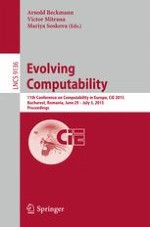2015 | OriginalPaper | Buchkapitel
Kalmár and Péter: Undecidability as a Consequence of Incompleteness
verfasst von : Máté Szabó
Erschienen in: Evolving Computability
Aktivieren Sie unsere intelligente Suche, um passende Fachinhalte oder Patente zu finden.
Wählen Sie Textabschnitte aus um mit Künstlicher Intelligenz passenden Patente zu finden. powered by
Markieren Sie Textabschnitte, um KI-gestützt weitere passende Inhalte zu finden. powered by
